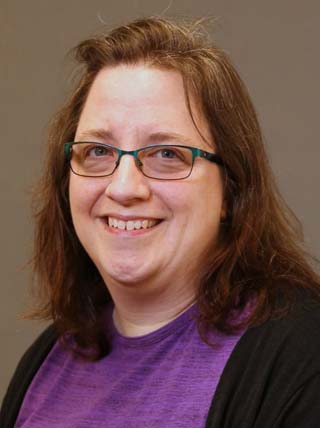
By Jill Pope, Senior Scientific Editor
 Mari Gilmore, MS, CGC
Mari Gilmore, MS, CGC Jamilyn Zepp, MS, CGC
Jamilyn Zepp, MS, CGC
In honor of Genetic Counselor Awareness Day on November 9th, 2023, which helps people better understand the role genetic counselors play on their healthcare team, let’s take a closer look at the work of two genetic counselors at the Kaiser Permanente Center for Health Research (CHR): Mari Gilmore, MS, and Jamilyn Zepp, MS.
Mari and Jamilyn worked together in the Genetics Department of Kaiser Permanente Northwest for several years before both coming to work at CHR. Now, as part of CHR’s Translational and Applied Genomics Department, both counselors see only patients who are enrolled in research studies. These studies are helping to answer important questions about how to translate new genetic tests into real-life health care.
The CHARM study, for example, explored how health systems can ensure equity of access to genetic testing and counseling for patients with inherited cancer risk. In that study, patients made real care decisions based on what they learned from genetic testing. Other studies in recent years have included testing for couples who are planning pregnancies (NextGen) and testing to identify patients with inherited ovarian cancer syndromes (GRACE), so that their family members can be offered testing.
Genetic counselors help patients understand why they have been referred for testing and what tests may be available to them. Once testing is done, they deliver and discuss results with the patient, help the patient understand what they mean, and explain next steps.
The job of a genetic counselor also extends beyond the time spent with each patient. For each hour with a patient, genetic counselors do about a half-hour of preparation, reading over each patient’s test results and medical chart, and planning what information to cover. After each visit, counselors do follow-up work, documenting what was discussed and arranging care hand-offs. When testing is offered to family members, genetic counselors will often talk to those relatives directly and facilitate testing for them.
What Happens After Results are Delivered?
What people learn from genetic testing can change the medical care they receive. Genetic test results can change the type or frequency of cancer screening a person receives, for example. Test results can lead to a recommendation for breast MRI rather than standard mammograms, or to a new recommendation for pancreatic cancer screening. Based on test results, genetic counselors might also recommend earlier screening (breast cancer screening at 30 instead of 40) and more frequent screening (colonoscopy every 1-2 years instead of every 10 years).
Genetic testing performed in a CHR study several years ago may have saved a baby’s life. A NextGen study participant learned during her pregnancy that she was the genetic carrier of a rare disorder. She had no idea her baby could be affected, and without the testing offered by the study, she would not have known. Prenatal testing confirmed her baby had inherited the disorder. This enabled a medical team to prepare for the baby’s arrival and provide prompt, lifesaving treatment when he was born (see case report). The participant told the research team, “Even though it was hard to learn... we might not have our son today if we didn’t know. I think my son is alive today because I took that test.”
Whether giving crucial information to an expectant couple, helping patients understand their inherited cancer risk, or offering family members of patients the chance to be tested, CHR’s genetic counselors perform a vital role. We learned more in a brief Q&A.
What was your training like to become a genetic counselor?
Mari: I’ve loved genetics since middle school. I wanted to learn everything about it. I went to Boston University and got a Master’s in Genetic Counseling in a two-year program. Some programs are more genetic information-heavy, and some are more counseling-heavy. You’re trained in how to provide support, help people make decisions, and when to refer people to other resources. As with most training for providers involved with direct patient care, our training includes counseling patients with a clinical supervisor present.
What recent advances do you see making an impact on people’s health care?
Jamilyn: Testing technologies have exploded, both how quickly you can get your results back and the number of genes that can be tested. In addition, what we know about the effects of different genes has changed a lot, such as a gene now being linked to a new risk for cancer or that the gene is more common and thus, the risks are lower for a disease to develop.
Mari: We’re trying to learn how to help people prepare for what information testing can and cannot give them, and for what to expect when they receive these results. How do we effectively communicate the benefits and limitations to patients so that they can make informed decisions? How do we help them adapt to the information learned from genetic testing?
Do you have a special area of interest or expertise?
Mari: I’m interested in reducing barriers and increasing access to genetic counseling services. I like that I get to be a research genetic counselor. I used to think you had to be either a researcher or a genetic counselor. But I get to do research and still be a genetic counselor, providing support to patients and families.
Jamilyn: I like to make sure that people understand what their choices are. I have been doing this since 1995. In the beginning you feel you have to impart xyz knowledge… “You need to know all of these things,” and now it’s more like “Here’s the minimum,” and, “do you want anything more beyond that?” In the CHARM study, we tested a new approach that purposely delivers less information to the patient and focuses more on what the patient wants to know.
I’m also very interested in cancer genetics research, which I have been involved in since 1996. I feel like what we knew then versus now is so much different, plus we recognize that how we share the information makes a big difference in understanding. I have a lot of interest in ovarian and colon cancers and their genetic risk factors, as well as family communication about inherited risk factors. A lot of why we test cancer patients for genetic risk factors is to benefit their relatives, but not all relatives want to know that information.
What part of your job is the most difficult?
Jamilyn: Patient expectations can be difficult. Sometimes a person comes in with an idea of what they think they need, and the doctor might not agree, and that doesn’t feel good to them. But sometimes I have to give a person what I think is bad news, like “Hey, you’ve got this genetic susceptibility to cancer” and then the person might surprise me by saying, “Well, it is what it is.”
What part of your job do you enjoy the most?
Jamilyn: Being able to make a difficult situation easier for a person is really my favorite part. We don’t always have great news for people but being able to facilitate understanding and coping is an important skill. For example, I don’t love telling people they have a very high risk of cancer, but helping them put it in context and know that there is a plan for follow-up can be reassuring.
Another example: I spoke with a participant who needed to tell the story of how her relative died of cancer in another country during the pandemic, when they were unable to travel to see them before diagnosis and death, and unable to be present at the funeral. A lot of the story isn’t related to my needs as a genetic counselor or a researcher, but I was able to hear them and validate their pain and anger which may make it easier for them to process the experience. In my role, I have the time to do this, and it is very rewarding.
Mari: It is very rewarding to help a patient and their family get answers to questions they have, through education, locating relevant resources, and genetic testing when indicated. Supporting families through challenging experiences and maintaining a collaborative and trusting relationship with them over time brings me joy.
Jamilyn and I have talked about how there are certain families whose stories will stay with us forever because of the impact the family had on us, that we learned a lot from them as we provided their care over the course of months or years. For the research aspects of my work, I most enjoy exploring how we can provide better care to patients who need genetic counseling and testing and sharing those research findings with the broader genetic counseling community.
What other kinds of jobs can genetic counselors do?
Mari: In addition to jobs in research and in the clinical setting, there are jobs for genetic counselors in industry, working for genetic laboratories. There aren’t many Genetic Counseling master’s degree programs in the country—there are about 50, and most programs have a small number of slots available per year. So, we are often considered a scarce resource.
Genetic testing is becoming more widely available as part of medical care. Genetic counselors play a key role by helping patients make sense of their test results and understand next steps. To learn more, explore the National Society of Genetic Counselors’ website.
More About CHR’s Genetic Counselors
Jamilyn Zepp, MS, CGC
Certified Genetic Counselor, Research Associate II
Pronouns: she/her/hers
Jamilyn Zepp has been a genetic counselor for 28 years, in a variety of settings and specialties, with a special interest in cancer genetics since 1996. Her work at CHR has been in identification of hereditary cancer syndromes, in both cancer patients and at-risk family members. Her interests include Lynch syndrome (LS; people with LS are at increased risk for colorectal cancer and other cancers) and Hereditary Breast and Ovarian cancer (HBOC syndrome; people with HBOC are at increased risk for breast and ovarian cancers). She received her bachelor's degree at the University of Washington and her master's degree from University of California, Berkeley.
Mari Gilmore, MS, CGC
Certified Genetic Counselor, Research Associate III
Pronouns: she/her/hers
Mari Gilmore has been a board-certified genetic counselor for over 13 years, with experience working in a variety of clinical specialties. She has been involved with several genomics studies at CHR. Her research interests include the identification of individuals with hereditary cancer syndromes (such as HBOC and LS), evaluating ways to provide more equitable access to genetic counseling services, and the clinical actionability of genomic test results. She received her bachelor’s degree at Willamette University and her master’s degree from Boston University.